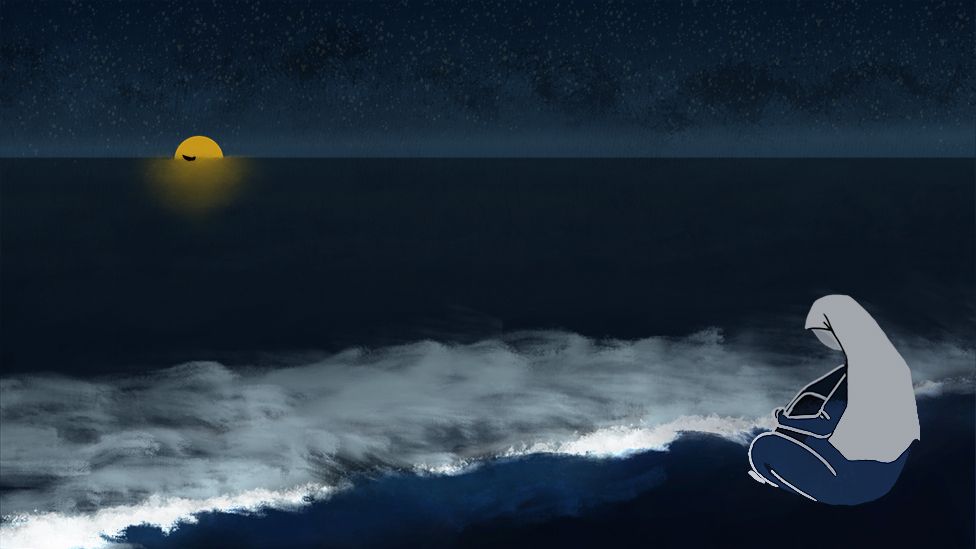The Rohingya refugees trapped on a remote island miles from land

When Dilara set off from the Bangladeshi coast, she dreamed of a new life in Malaysia.
But she and hundreds of others who had crammed into the boat ended up being rescued, having spent days floating at sea, after being turned away at the border.
Yet they were not returned to the mainland and the families they had left behind.
Instead, their rescuers left the group on an island created out of silt in the middle of the Bay of Bengal, with no hope of escape.
"I don't know how long I will be here. I have no way out," the unmarried young woman, who fears leaving her room after dark, told the BBC.
"I will grow old and die here alone."
Short presentational grey line
Dilara was among the first of a planned 100,000 Rohingya refugees to arrive on Bhasan Char, a piece of land measuring 40sq km (15 sq mi) in size which had only previously been used as a brief stop-off point for fishermen.Bangladeshi authorities have heralded it as part of the solution to the overcrowded refugee camps in Cox's Bazar, home to almost a million Rohingya refugees who arrived in recent years. Most of them fled a military offensive by Myanmar's army in 2017, which the United Nations later described as a "textbook example of ethnic cleansing". Some had fled earlier violence.
But the refugee camps where the Rohingya have now made their homes have become, authorities say, hotbeds of crime. The new $350m (£246m) development on Bhasan Char - an island which emerged 15 years ago from the sea - is touted as a fresh start.
But refugees the BBC spoke to by phone on this small island of Himalayan silt say differently. They describe a place where there is no work, few facilities and little hope of a better future.
Those who try to flee, they say, are caught and beaten, while refugees are turning on each other as frustrations rise. Worse, at just 2m (6ft ) above sea level, they fear one big storm could wash them away.
Despite the BBC being granted a tour of the island last year, it is hard to say what is happening there. No journalists, aid agencies or human rights groups have been given free access to Bhasan Char, which is 60km (37.5 miles) from the mainland.
These are the voices of a few residents, and their names have been changed to protect their identities.
'Such a desolate place'
"I wondered how we would survive here," Halima said, recalling the December night she arrived, heavily pregnant, with her family.
"It was such a desolate place. Apart from us, nobody lived here."
Their isolation became all too clear the next day when she went into labour, with no possibility of finding a doctor or nurse.
"I had experienced childbirth before, but this time it was the worst. I can't tell you how painful it was."
Her husband, Enayet, rushed to get a Rohingya woman living in the same block, who had some experience and training as a midwife.
"God helped me," says Halima. She had a girl and named her Fathima.
Rohingya face a new peril on a remote island
'The bodies were thrown out of the boat in the night'
What you need to know about the Rohingya crisis
Enayet had signed them up for a new life on the island without telling his family.
"They [Bangladesh officials] promised us many things like a plot of land for each family, cows, buffaloes and loans to start a business," he told the BBC.
The reality has been very different, although Halima says she is happy with the running water, bunk beds, gas stove and shared toilet in her accommodation.
The biggest problem is they can't afford anything more than very basic food.
Families in Bhasan Char are provided with staples like rice, lentils and cooking oil. But the refugees need to buy other items like vegetables, fish and meat. There is no market, but some Bangladeshis run shops on the island. Travel to the mainland is impossible: no ferry service exists, and the navy - which runs the facility - only transports the refugees one way.
"We are poor people," Halima says, "We don't have any income to buy food and other stuff."
It was food which sparked the island's first protest back in February. Video seen by the BBC shows Rohingya women and men running with sticks and shouting.
Officials downplayed the event.
Stranded at sea - survivors' stories
Growing up in the world's largest refugee camp
The 'forgotten' refugees taking their lives
"It was not a protest," says Shah Rezwan Hayat, the head of the Refugee Relief and Repatriation Commission (RRRC), which manages Bangladesh's refugee camps.
But refugees say desperation is growing and some are risking their lives to leave Bhasan Char.
"Many people tried to flee from the island. As far as I know, at least 30 people have left the island," said one resident, Salam.
"I have heard about an incident, where about five people were caught while trying to flee from the island. They were taken to the police camp and beaten up by police."


Giro dItalia: Israel to host 2018 Big Start to Grand Tour cognizableness
- The 2018 Giro dItalias first three stages will take place in Israel, making the May race next year

Fiji scrambles to provide aid as cyclone toll rises
- Fiji scrambles to provide aid as cyclone toll rises

Miley Cyrus Chokes Up Over "Wrecking Ball" at Pre-Super Bowl Performance With Joan Jett and Billy Idol
- Miley Cyrus joined forces with rock stars Joan Jett and Billy Idol while performing at Super Bowl LV and almost couldnt finish her emotional song "Wreckin